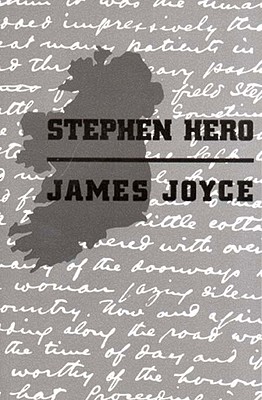APS TOGETHER
Day 13
Stephen Hero by James JoyceAdditional Manuscript Pages
January 24, 2022 by Belinda McKeon
When Joyce moved to Paris in June, 1920, he left his literary manuscripts with his brother Stanislaus in Trieste; soon afterward, at Joyce’s request, Stanislaus sent the bulk of those manuscripts to him in Paris. Sylvia Beach eventually offered these pages for sale, and they were published in 1944. But in 1950, John Slocum purchased from Stanislaus an additional twenty-five pages, and they were printed as we find them here, by New Directions, in 1963.
This chapter is known as the Mullingar episode, a term which is indescribably hilarious to those of us who were born (a Mullingar episode?) in that small town in the Irish midlands. It’s just…not the kind of place you expect to meet with in a Joyce novel. But here it is. The bulk of these pages tell of a visit that Stephen makes to his godfather, Fulham, in Mullingar, shortly before Stephen begins his studies at UCD. His godfather, you will remember, pays his university tuition.<
The pages begin, though, with eight lines of manuscript which would eventually become the closing flourish of the diary entry with which Portrait concludes. On the manuscript, the words Departure for Paris, inscribed by Joyce in blue crayon, mark the end of this eight-line passage, and would of course become the words which mark the end of Portrait. The opening passage, like a number of the passages which make up the Mullingar pages, was woven by Joyce into the pages of Stephen Hero from the collection of epiphanies which he had recorded between 1898 and 1904; encountered scenes or moments, richly perceived by the eye of the fledgling writer, and written down as scenes, either because they could not be wasted – because they had to be captured – or because he fully intended to use them in a novel, or both. This opening epiphany was eventually used in the last pages of Portrait, where it was tied to Stephen’s abandonment of Ireland and its paralysis for the greater openness of the Continent, but when it was written as an epiphany, it seemed to have to do with the changes wrought by puberty, with that transition from boyhood to adolescence, and seen in this way, its appearance at this point in the Stephen Hero manuscript makes more sense.
Once the opening vision has been dispensed with, we are off to Mullingar with Stephen. Note at the beginning of this scene a narrative voice so different to the voice used elsewhere in the manuscript that it sticks out quite awkwardly; you are therefore to conceive Stephen Daedalus packed in the corner of a third-class carriage and contributing the thin fumes of his cigarettes to the already reeking atmosphere. This moment of Victoriana, an instruction to the reader which places them at a distance from Stephen, peering at him as a character rather than as the vivid presence in whose company we have spent the rest of the novel, is of a type not repeated by Joyce anywhere in his work again. It may have been something he was trying out to immerse himself in the scene at hand, which in any case quickly takes on that vividness and sensuality which animate the rest of the manuscript, as Stephen observes the “peasants” in the train carriage and endures the “debasing humanity” of their odor. At Mullingar, he is met by a driver There’s something striking, too, and something which seems different to the rest of the manuscript, in the squeamishness or snobbishness displayed by Stephen in these Mullingar scenes toward the dirt and squalor of the rural or peasant-class people and environments he encounters here. He notes several times that places are dirty, or not clean, or that people smell or look somehow primitive. It’s not as though, in the Dublin scenes, Stephen is living in splendor, or in any kind of polished cityscape; it may be, rather, that the younger Stephen has not yet experienced his family’s financial downfall, or that, as a boy still within sniffing distance of his own flirtation with the idea of the priesthood, he still regards many of his fellow citizens with a moral distaste, rather than with the artist’s interest into which he will grow while at university. Still, the chapter closes with an unforgettable scene in which his watchful interest in the indignities of life and death is on full display; a woman, escaped from the local asylum, has drowned in the canal, and her body has been fished out by some local men and laid out on the canal bank. Until the doctor arrives to pronounce on her, Stephen watches with the others gathered, and what catches his eye in the end of all is not the unfortunate woman’s body, or her nightdress which rode up over her body and was fixed by a bystander, but the fragment of a magazine, The Lamp, floating on the surface of the canal. Just the title page remains clear; “the rest was torn away and several other pieces of paper were floating about in the water.”
It wasn’t the intended end, but it’s an apt one.
